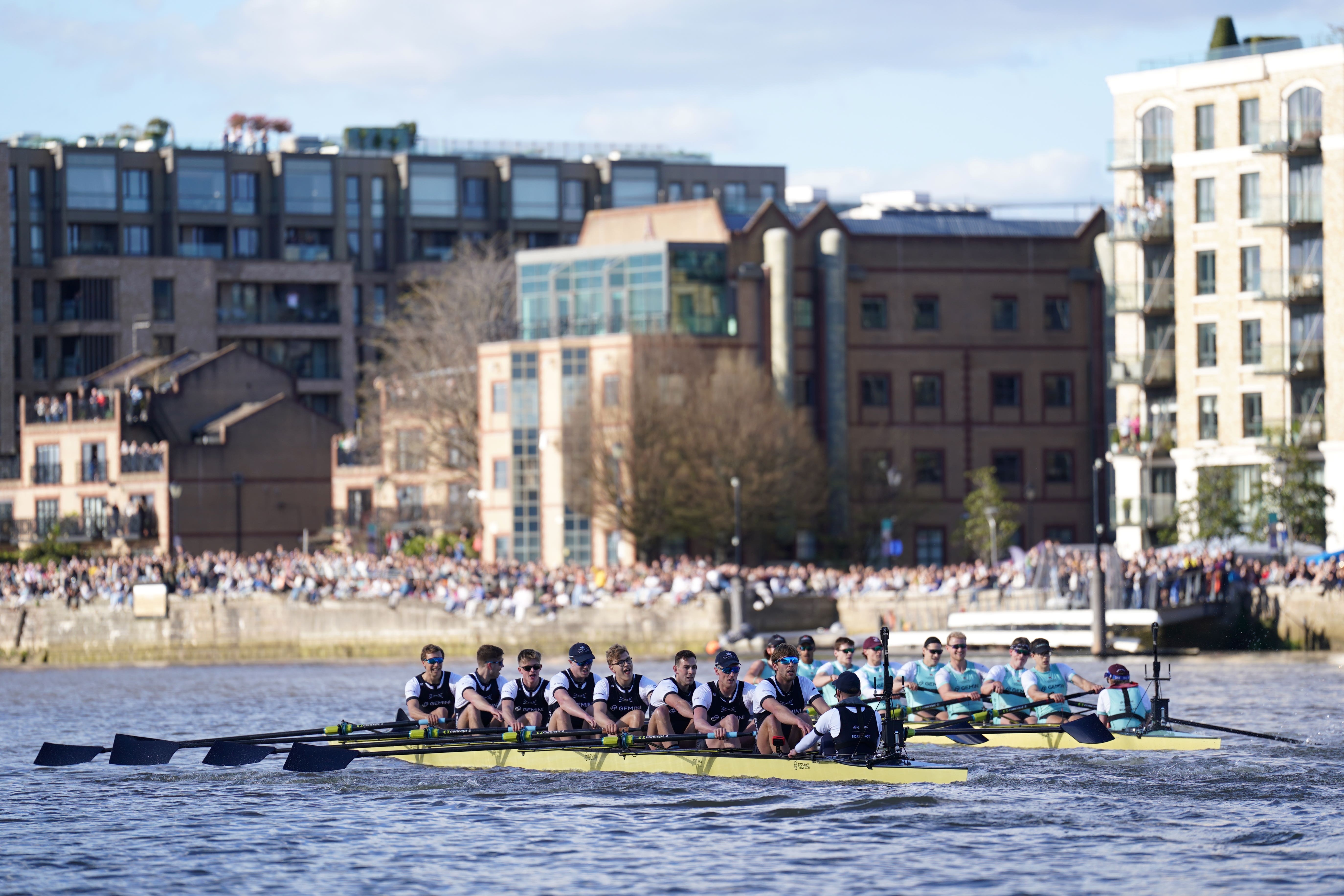Oxford coxswain refuses to blame illness after favourites beaten in boat race
Cambridge won both the men’s and women’s races after a week which saw high levels of E. coli discovered along the course.

Oxford coxswain Will Denegri refused to blame illness for why the favourites suffered a disappointing loss in the 169th edition of the men’s Boat Race.
Cambridge, whose women secured a seventh successive trophy, were seen as underdogs despite doing the double last season but took the honours on a sunny Easter weekend where the pleasant conditions were in contrast to the discovery, earlier this week, that high levels of E. coli had been found along the course.
E. coli can cause a range of serious infections and other side-effects and rowers were told ahead of the race not to enter the Thames.
As a result, neither winning crew elected to partake in the tradition of throwing their cox into the river, and while Oxford’s seven seat Leonard Jenkins had earlier revealed to the BBC that he and several crewmates had been plagued by what he branded an E. coli-related illness, his cox was more reluctant to directly blame the bacteria.
Denegri said: “This week we’ve had three people who have had to miss sessions because they’ve had stomach bugs, essentially. Whether that’s related to E. coli in the river I don’t know, but it’s certainly not helped our campaign, and it’s a poor excuse.
“It’s not an excuse, but it definitely hasn’t helped our preparation. We obviously had a bit of a messy start, not the start we wanted. We had a great warm-up, nothing went wrong in the warm-up, so maybe that was not something we were expecting.
“It felt like we never quite got on the rhythm we were hoping to go onto, but at the same time it wasn’t terrible. We were doing a decent job. Cambridge I think today were just a quicker group, and that’s hard to take.”
This week we’ve had three people who have had to miss sessions because they’ve had stomach bugs, essentially. Whether that’s related to E. coli in the river I don’t know, but it’s certainly not helped our campaign, and it’s a poor excuse.
Earlier, Jenkins had told the BBC: “It would have been ideal not to have had so much poo in the water. But that’s not to take away from Cambridge.”
Cambridge triumphed by three and a half boat lengths in a time of 18 minutes and 56 seconds.
They have now won five of the last six editions and had taken a substantial lead by the final push to the finish, Oxford’s only glimmer of hope coming when winning stroke Matt Edge had visibly been pushed to his limit.
The dark blue boat drew closer, but by then Cambridge had rallied behind their ailing team-mate and their earlier advantage proved too much for their rivals to overcome.
Denegri was more willing to acknowledge the role flooding at their Wallingford base played in Oxford’s preparation, which forced them on several occasions to make the trip to the much-further Caversham Lake.
He said: “It’s obviously affected us a lot, especially through February. Caversham Lake is an hour and 10 minutes’ drive from Oxford, so spending two and a half hours on the bus every day has definitely interrupted our training.”
Cambridge, who train at Ely, faced no such challenges nor, as chief coach Rob Baker later confirmed, did they have any illness concerns ahead of Saturday’s showdown.
Following guidance issued to competitors, Baker did insist Ed Bracey – who initially said he might be willing – did not get dunked in the Thames, arranging instead for a bucket of clean water to be dumped on his cox’s head.
Bracey said of the victory: “It was very noisy through the middle of the race and very quiet those last few minutes there, but we got it done. We got it over the line in the end.
“[The pollution news] didn’t really change the way we handled anything to be honest. The stuff we were being advised to do is what we normally do, so it was business as usual.”
Baker, who was not aware of the illness plaguing Oxford, agreed Cambridge’s flood-free Ely HQ – “the best place to train in the country” – was an advantage, and confirmed Edge, who was attended to by medical staff, needed some fuel and warmth after the race but thought his stroke would be “fine”.
Asked about the E. coli controversy that had marred an another otherwise brilliant weekend for Cambridge, he added: “It’s obviously not a great situation. We’d like cleaner waterways and not have such a risk for our athletes.”